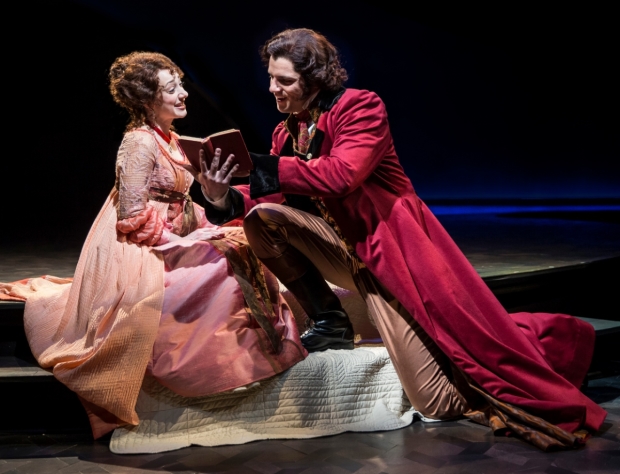Sense and Sensibility

(© Liz Lauren)
She’s the godmother of all rom-coms, but Jane Austen and her 200-plus-year-old stories of women navigating 18th-century England transcend reductive genre stereotypes. It’s never just love at stake for the women in Austen’s novels – it’s survival. Barred by law from inheriting property and from holding any professions other than governess, prostitute, or sweatshop worker, Regency-era women who didn’t marry were in grave danger of plunging into the bleak under-tiers of society where anything beyond the barest necessities was a luxury.
With Chicago Shakespeare Theater‘s world premiere of Paul Gordon’s musical take on Austen's novel Sense and Sensibility, the story of Elinor and Marianne Dashwood captures the heady romantic aspects of the 1811 novel. But the show fails to depict the potentially ruinous peril the Dashwood sisters face after the death of their beloved father. Director Barbara Gains shapes a production that looks and sounds achingly beautiful and also emphasizes the heartfelt aspects of love into which Austen delves. Lost in all the prettiness and in Gordon’s lush, melodic score and lyrics is any sense of the ugly danger looming on the sisters’ horizon. If these girls don’t find husbands, heartbreak will be the least of their problems. They risk becoming penniless, homeless, and as marginalized as an urchin from Dickens.
At lights up, we meet sisters Elinor (Sharon Rietkerk) and Marianne (Megan McGinnis), both bereft in the wake of their father’s death and at the mercy of relatives who don’t care whether they wind up begging on the filthy London streets. The late Mr. Dashwood made his son John (David Schlumpf) promise to provide for Elinor and Marianne, but John’s grasping wife, Fanny (Tiffany Scott), loses no time in convincing John to evict the sisters from their lifelong home and reduce their monthly allowance to a pittance.
As Elinor and Marianne struggle with their new circumstances, the significance of Austen’s title becomes clear. Ever the romantic, Marianne wears her heart on her sleeve, blurting out precisely what she’s feeling and living according to the dictates of her heart, no matter the consequences. The pragmatic Elinor is far more reserved. If there’s a battle between her head and her heart, she’ll cautiously weigh all options and outcomes before deciding which to follow.
Gaines oversees a delightful and exceptionally capable cast. As the effusive Marianne, McGinnis is charming. There’s a radiant innocence to her presence, and with that innocence a vulnerability that calls to mind a doe among wolves. Rietkerk’s Elinor has a strong maternal streak and an understated ferocity when it comes to looking after her younger sibling. Both women have gorgeous voices well-suited to Gordon’s score. Bittersweet duets such as "Somewhere in Silence" or emotional solos (especially Elinor’s "Not Even You") build on the rhythms embedded in Austen’s text.
Plenty of dashing gents share the stage alongside the winsome sisters. As a chap "on the wrong side of five and thirty," Sean Allan Krill’s Colonel Brandon is impossibly handsome and charismatic, but he’s also as awkward as an eighth grade boy at his first school dance when it comes to wooing. It’s a performance that’s at once moving and quite funny.
As the cad John Willoughby, Peter Saide oozes allure, making the eventual revelation of Willoughby’s feckless nature all the more enraging. As Elinor and Marianne’s greedy sister-in-law, Fanny, Scott becomes somebody you love to loathe. Paula Scrofano clucks and putters with marvelous comic impact as the meddling Mrs. Jennings while Wayne Wilcox crafts a character of integrity and conscience as Edward Ferrars, a man who long ago made a promise he’s come to regret.
Gordon’s score and lyrics build on the inherent musicality of Austen’s prose. Music director Laura Bergquist leads a 10-piece orchestra that enriches the story’s colors and tones while propelling the plot forward. Costumer designer Susan E. Mickey’s Regency-era gowns and suits are period-perfect down to the buttons. And Kevin Depinet’s minimal but elegant set design provides an apt, lovely backdrop for the production.
Gordon and Gaines have done well by Austen with Sense and Sensibility, but they could do far better. Elinor and Marianne face an ugly abyss in their future, the stakes of which are never really apparent in Chicago Shakespeare’s production. The world of Gordon’s new musical is drenched with light, even when the shadows of the sisters’ reality threaten to swallow them whole.











